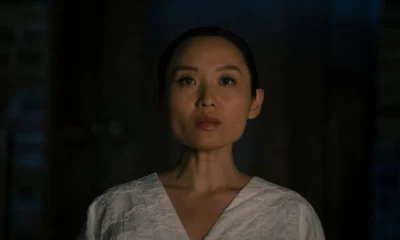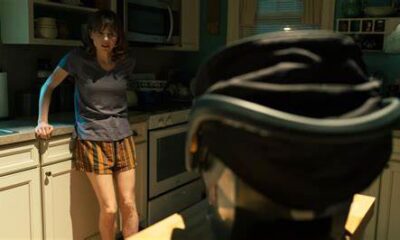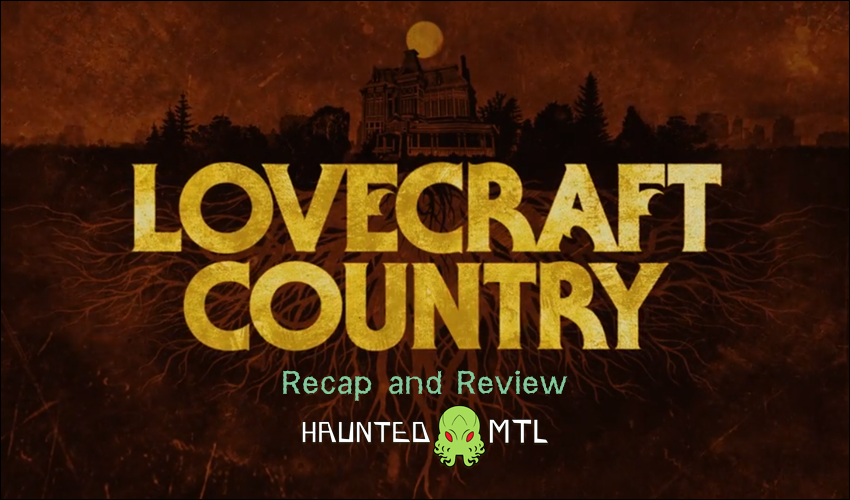
Lovecraft Country: S1E3
After last week’s relative stumble, can Lovecraft Country pick up the pieces and slow its pace? Is the show still burning the candle with a flamethrower, or has it shifted to something a little more moody?
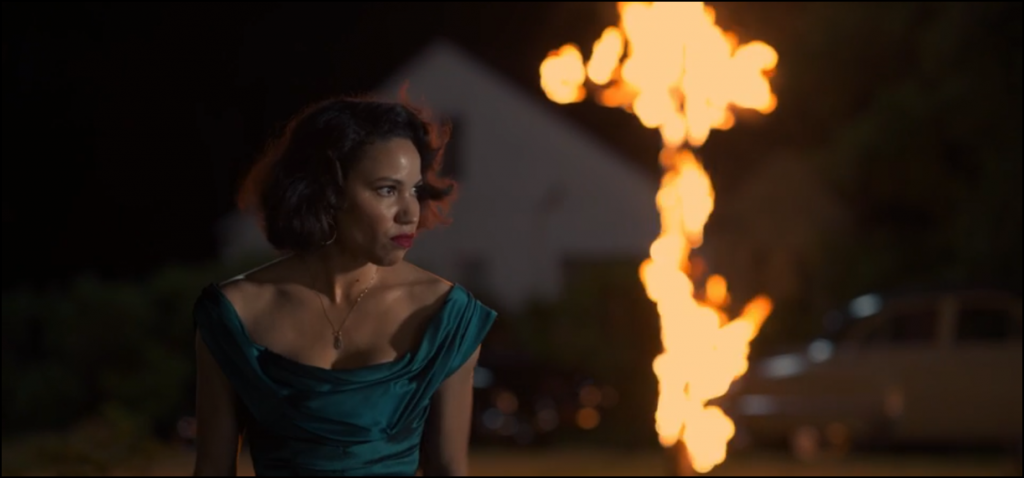
The story so far…
“Holy Ghost” opens with a dire warning that in 1955, three people will disappear from the recently-purchased house of Leticia Lewis, and with that Lovecraft Country turns into a haunted house story for the duration of an episode. Throughout the episode title cards updating the timeline over the course of days suggest something awful approaches.
Leti, as with the other Ardham survivors, has a lot to work through. We open the episode with her in church, but while those around her take in the joy and comfort of God she can only shed tears. That changes, however, when she reveals to her sister Ruby that she purchased a run-down old house in a white neighborhood and plans to turn it into a boarding house. Leti throws herself into different things to come to terms with what bothers her, her boarding house, trying to reconnect to her sister, her photography, celebration, sex with Atticus, and rage against white agitators in the neighborhood, but none of it helps.
It takes a truly selfless action, motivated by ghostly encounters, to find a form of salvation that has escaped her since the flight from Ardham. At her lowest point, separated from her sister (again), her tenants, and still dealing with the guilt of surviving when George died, she turns her attention to the evil in the house, in the form of a cultist doctor’s ghost, and hopes to put the spirits of the 8 murdered black people to rest. She finds that salvation, by the end of the episode and finds a renewed home.
Let’s extended focus leaves a little less room for the rest of the cast in the aftermath of Montrose’s rescue, but we get snippets of life after the death of George. Hippolyta takes out her frustrations on Atticus, whose well meaning attempts to help her and Dee just rub her the wrong way. She event turns to destruction, tearing the pages from George’s favorite book, Dracula. Her discovery of an astronomical model within a locked room of Leti’s house, however, might mean something. After all, Hippoltya had an interest in the stars and we see the model is curiously absent later, when two of the white neighbors break into the house to inflict harm.
Atticus is feeling lost and with fewer answers than he had hoped. He intends to head back to Florida, but is convinced to stay long enough to help ensure that Leti’s house remains safe from the white neighbors. He tries to connect with Montrose who would rather drink, and their discussion is cut short by a violent outburst on the part of Montrose over the topic of keeping the truth of George’s murder secret. He eventually aids Leti in the process of exorcising the house through a Voudou ritual at one point becoming a vessel for the sinister spirit within. Tic’s final moments of the episode have him confront Christina Braithwhite, who arranged the entire scheme of putting the house in the possession of Leti. Atticus nearly killer her, but her formidable powers prevent that, and she lectures him on the dangers of killing white women and offers him a task, to track down missing pages from The Book of Names.
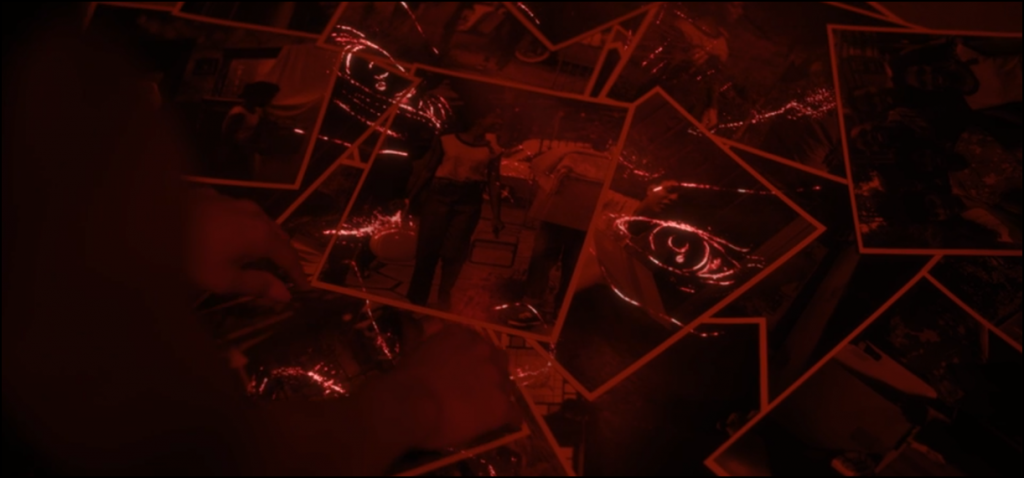
How it worked out…
Lovecraft Country is a show of tremendous potential, but I am becoming concerned that it may not live up to it. I’ve given up, at this point, on the idea of being scared of otherworldly creatures and concepts in the show. The horror of the specter of racism is enough in that regard. Yet, for a ghost story there should be some material that is unnerving, correct? Nothing about “Holy Ghost” struck me as remotely scary outside of the inhumanity of man. Though, maybe that is the point.
Ghost stories are a particularly favorite genre of horror for me. I adore ghost stories but came out of “Holy Ghost” rather passive about the hour run-time. This might be best blamed on the pacing of the show which, continuing the precedent of episode two, feels like sprinting through a story rather than letting it play out. The show has the challenge of juggling the ongoing stories of the characters while establishing the anthologized storylines that the characters weave in and out of. In that regard, you would think it would make sense to give those elements room to develop, but that does not seem to be the approach for Lovecraft Country.
That being said, the ghost story present in the episode isn’t bad at all, and it plays pretty well with the show’s exploration of racism and the abuse of black bodies (quite literally). It’s just that there is no tension in the episode actually connected to the ghost story at all, and what would normally make for a full movie or a couple of episodes end sup getting handled int he span of about 40 or so minutes. We see the signs of a haunting, the major encounter, the research, and the exorcism – all in one episode. It feels a little much, especially when the show also tries to tackle the trauma and grief of George’s death as well. With the limited time the show can spend with different characters and plotlines the developments are admirable, but also a little perfunctory, less full explorations and more like checkmarks on an outline.
Lovecraft Country is burning through multiple episodes of storytelling to diminishing results. Despite a strong foundation, mood and tension have given way to a breathlessly paced ghost story where little seems to haunt.
I give the third episode, “Holy Ghost,” four Cthulhus. I gave this one a little bit of a ghostly-bump simply because the bones are solid. I don’t know what possessed me.
 (4 / 5)
(4 / 5)
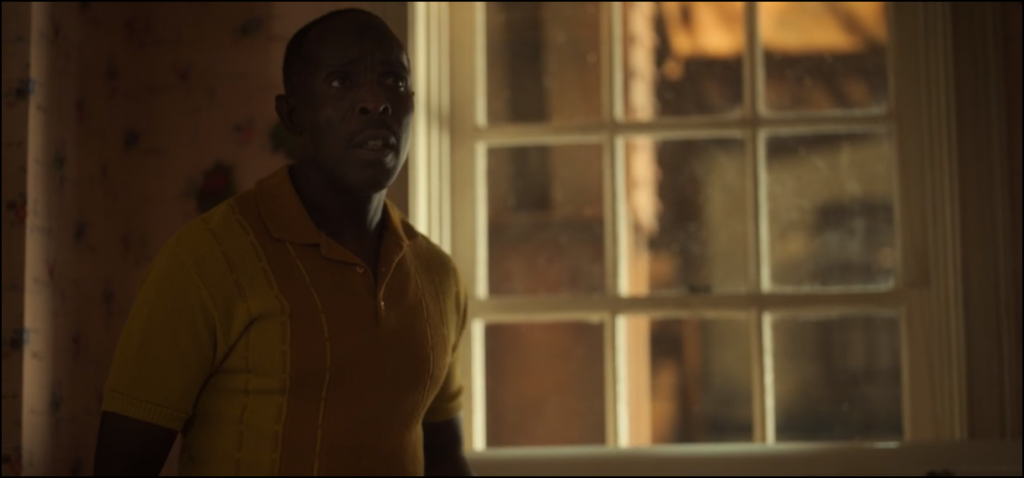
Miskatonic Musings
As always, there is a wealth of references to uncover in an episode of Lovecraft Country.
- Jurnee Smollett leads the charge this week with an episode that gives her a great range of emotion and is worthy of notice in any list of great actresses.
- One of the boys playing with the Quija board may be referencing the real-life Emmett Till, which is another example of the profound horror Lovecraft Country evokes best.
- We see Dracula and The Count of Monte Christo again. I’m definitely curious about Montrose’s record collection.
- So what was with the ghosts? Well, the previous owner of the house, Hiram Epstein, was engaged with his own experiments to reach the Garden of Eden, but he used kidnapped black people from Chicago to do so. The ghosts as they are seen throughout the episode bear the scars of those experiments which seem to have something to do with time travel. So now you know why the basketball player had a baby’s head.
- These experiments definitely echo the experiments on black people, such as the harvesting of the cells of Henrietta Lacks or the horrific Tuskegee Study.
- The poem in the opening sequence at the church? It came from a 2017 Nike ad featuring Leiomy Maldonando.
- While Lovecraft didn’t write about ghosts often in his stories, but there are some significant ones, such as “The Mound,” a novella he ghostwrote. The further irony is that the story was published posthumously.
- Lovecraft also wrote a great deal on supernatural horror, such in his essay, “Supernatural Horror in Literature,” which shares some thoughts on ghosts.
- The show continues to use a great mix of contemporary and anacrhonistic music. Let’s close out this review with my favorite song from the episode, “Good Rockin’ Daddy” by Etta James:
What did you think of the third episode of Lovecraft Country? Let us know in the comments.
And yes, I did update the title graphic for the reviews, thanks for noticing.
Movies n TV
Wheel of Time A Question of Crimson Is a Political Espionage Delight
Episode two of Wheel of Time felt like the beginning of a long journey. Stories are unfolding, lives are changing, and blood is spilling.
Let’s discuss.
The story
We begin this episode in the past with Elayne’s mother, Queen Morgase. It turns out her rise to the throne was a bit, shall we say, cutthroat. So when she shows up at the White Tower, Siuan is concerned.
She might have reason to be, too.
Meanwhile, Rand, Egwene, Moiraine, Lan and Aviendha are in the Spine of The World. As they travel through some of the most breathtaking lands I have ever seen on a TV show, Egwene is plagued with nightmares. We think at first that’s just her trauma working itself through her system. But we soon find out that it might not be that straightforward.
Finally, Perrin returns home to heal after his hand is almost cut in half. But when he gets there he finds the town has been infested by Children of The Light. And they’re looking for him.
What worked
There was something heartwarming in this episode about political espionage and choking religious persecution. And that is Elayne’s relationship with her family.
I have consumed a lot of fantasy content with royal families. And I have never once heard a princess call her mother ‘Mum’. I’ve never seen royal siblings get along. And I have sure as hell never seen a princess have a good relationship with her step-parent.
This was refreshing. Even though Queen Morgase is kind of a horrible person she seems like a good mother. And that’s an unexpected delight.

Of course, this is just one storyline among many. And while this can sometimes be overwhelming, in this case it wasn’t.
I’ll be honest, some of these storylines are going to drag for me. I know this because I’ve read some of the Wheel of Time books and I have an idea that not all the characters exactly pique my interest.
No one likes all the characters. No one likes all the storylines. While I am here for the political espionage between Queen Morgase and Siuan, not everyone likes it. While others might be fascinated with Selene trying to win Rand back, I couldn’t care less.
Having multiple storylines keeps everyone’s attention better. So long as things don’t get out of hand. Things can easily get out of hand. But this seems to be managed well.
So far.
What didn’t work
As I mentioned above, I’m not thrilled with Rand’s story at this point. And while it’s fine to not like a storyline when there are this many to choose from, it’s not fantastic that the one I like the least is the one involving our two main characters. And anytime we were with the team at the Spine of The World, the only thing that brought me joy was Moirain’s hat. It reminded me of Stockard Channing’s hat in Practical Magic.
The problem is that Rand is Charlie Brown with controversial magical powers. He is boring, serious, and pessimistic.
And yes, I understand that he has a heavy emotional burden and he’s the Dragon Reborn and that’s quite taxing and all. But let’s be fair, there isn’t a single person in this show that doesn’t have a heavy burden. And most of them manage to be fun occasionally.

All that being said, this episode of Wheel of Time did exactly what it needed to do. It set up conflicts at each of the three locations. It established emotional ties between the characters and the events. And it established goals for everyone.
This was, in short, a solid episode. Not groundbreaking, not mind-blowing or life changing. It was simply good. It was entertaining and moved the plot forward.
Well done.
 (3.5 / 5)
(3.5 / 5)
Movies n TV
Wheel of Time Returns With A Bang
Wheel of Time is back for season three. There are mixed feelings regarding this. Last season, there were some serious pacing issues. And some serious sticking to the book’s storyline issues. But we’re two seasons in, and we don’t give up so easily. So let’s dive into episode one, To Race the Shadow.
By the way, I highly recommend watching this episode with the subtitles on. You’ll see why.
The story
We begin this episode with Liandrin facing a trial of sorts for her rampant betrayal. She does her best to gaslight her Aes Sedai sisters into thinking that Siuan Sanche is the real traitor.

When that doesn’t work, she reveals how many Black Aes Sedai have actually infiltrated the tower.
Spoiler, it’s a lot.
In the aftermath, our whole team gathers to drink and enjoy one night of relaxation before they head out to the Tear to form an army for Rand. All is going well until they’re attacked by myriad creatures and a sentient axe.
What worked
This episode was long. It had a run time of an hour and eleven minutes. And a lot of that run time was spent in heavy dialog scenes.
Fortunately, these were well-done scenes.
If you’re going to have a lot of talking scenes, there are good ways and bad ways to do it. Last season, we saw lots of examples of the bad way to do it. But this episode did it well. For one thing, other things were going on while conversations were taking place. The characters are drinking, playing games, walking through an interesting city. And the scenes themselves didn’t stretch out. They weren’t repetitive. We heard what the character had to say, then we moved on.
It was also nice that the point of these scenes wasn’t just info dumps. We had character development. We had romantic interactions. We had plot development and foreshadowing.
Overall, this episode felt like what it was. A moment of calm before a storm.
Taking a step back, I’d be remiss if I didn’t address the fight scene at the start of the episode. Because it was epic.
The magic looked amazing. The martial arts that went along with it looked fantastic. The costumes were beautiful. It was just incredibly fun to watch.
More than that, it was emotional. We lost some characters in that fight that were important. And it was clearly emotionally shattering for many of our characters, who found themselves betrayed by people they trusted.
So many of them.
It was a great way to open the season.
What didn’t work
Despite that, this episode wasn’t without its flaws.
First off, there were a lot of dialog scenes. And they were good scenes, as I’ve already discussed. But it was one after another after another. And when your episode is, again, an hour and eleven minutes, it’s maybe a little much to have so much chit-chat. Couldn’t some of these conversations, important as they were, have been moved to maybe another episode?
Finally, I want to talk about Egwene’s travel through the arches.

I feel like maybe there were some deleted scenes here. Because there must have been more to that visit than what we saw, right?
We could have seen Egwene battle Rand. That would have been badass and emotionally devastating. We could have seen her with a quiet life with Rand back home at the Two Rivers. We could have seen anything except for the quick clip of Rand in a bloody river, followed by Egwene being shoved back out in a bloody shift.
Bad job. But at least it wasn’t an extended scene of Moiraine collecting bathwater, and then taking a bath while looking sad. If we’d started this season with another scene like that, it might have broken my brain.
Amazon dropped the first three episodes at once. So we’ll be back soon to talk about episode two. See you then.
 (4 / 5)
(4 / 5)
Movies n TV
Entertaining as hell: Eight Legged Freaks (2002) Review
Early 2000s is a special era for the industry. It accepts the cheesiness and corniness of movie making, in turn producing some gems in their own right. Eight Legged Freaks starring David Arquette and young Scarlet Johanson is a horror comedy about giant spiders who overtake a small town. As crazy as that premise sounds, the movie surprisingly has a ton of heart and is super entertaining. Let’s review, shall we?
Plot
We start Eight Legged Freaks with a shot of toxic waste spilling into the water supply of Joshua, a spider farm owner. He is friends with Mike, one of our protagonists, who is a science geek and a spider enthusiast. Mike notices something quite right upon visiting Joshua, but no one takes him seriously. We are then introduced to the rest of the crew. Mike’s mother Samantha, the town sheriff, is too busy chasing Ashley, his sister, who is dating the town mayor’s son Bret (something Samantha does not approve of). We also have Chris, who returns to the town to save his father’s legacy in the town mines. He has opposition from Wade, Bret’s father, who wants to use the mines for his business ventures. Lots of drama going on that will only get juicier once the spiders get loose.
The creepy crawlies quickly dispose of Joshua and make their grand appearance after Ashley rejects Bret’s advances, abandoning him in the middle of a desert. A glorious chase sequence ensues as the spiders make their way towards the town, wreaking havoc on its residents. In a true horror fashion (which the movie acknowledges), it takes some convincing from Mike and then from Samantha for the town to take the threat seriously. The tongue-in-cheek style of narrative adds the comedy aspect to a movie that would otherwise burn out fairly quickly.
The remaining characters hide out in a shopping mall as it’s the only somewhat sturdy building in the area. This doesn’t last long as the spiders break in, forcing them to run through the mines. Their resources to fight the creepy crawlies off are limited as the methane gas doesn’t allow them to use firearms. Such conditions require resourceful thinking from Chris, who uses perfume to fend off the leader of the spider group and save himself during the climax of the movie.
Character dynamics are not forgotten once the action kicks in. We have Chris confessing his long-term feelings for Samantha which she knew all along, which provided some comedic relief. Bret also reunites with Ashley and apologises for being an asshole. Mike finally gets the appreciation he deserves as his knowledge saves the townsfolk more than once during the whole ordeal.
We end the movie with the town’s radio show person telling the story as an urban legend during his segment. This brings it into question – how much of it happened the way he said it did? We can only guess…
Overall thoughts
Eight Legged Freaks is a fun creature feature with some self-aware commentary on genre tropes that doesn’t take itself too seriously. The acting is good, the pacing fitting and the characters are likeable enough for you to want them to make it through. Definitely a must watch, if you don’t suffer from arachnophobia, that is.
 (5 / 5)
(5 / 5)








